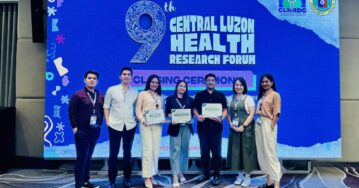A historic partnership was sealed on 14 August 2025 as Our Lady of Fatima University (OLFU) signed a Memorandum of Agreement (MOA) with the Municipality of Porac, the National Commission on Indigenous Peoples–Region III (NCIP R3), the Indigenous Peoples Mandatory Representative (IPMR), Indigenous Peoples Structure (IPS), Indigenous Political Organization (IPO), and Barangay Camias, Porac. The collaboration, formalized at the Conference Hall of Porac’s New Municipal Hall, seeks to advance healthcare, education, cultural preservation, and livelihood development for the Ayta brethren of Porac.

The MOA embodies a shared vision among stakeholders: to enhance indigenous knowledge and skills, improve socio-economic standing, and uplift the overall quality of life of the community. The partnership was also anchored on a Municipal Resolution passed earlier this month. On 5 August 2025, the Sangguniang Bayan of Porac approved Municipal Resolution No. 161, Series of 2025, expressing gratitude to OLFU-Pampanga for its proactive initiative to support indigenous peoples through programs of inclusive development.

A Framework for Sustainable Development
At the core of the agreement are projects on ethno-botanical and medicinal recording, ethno-economics with product development, community-based entrepreneurial development, mentorship, eco-cultural tourism, and community-based health programs, which will initially be implemented in Barangay Camias, Porac.

To ensure systematic execution, a Technical Working Group (TWG) will be created within thirty days, with each party designating three representatives. The TWG will be tasked with preparing development and action plans, scheduling activities, and coordinating site visits and ocular inspections. The Municipality of Porac has committed to providing venues and logistical support for these engagements.
OLFU’s Role and Commitments
As a higher education institution deeply rooted in its core academic principle of improving man as man, OLFU carries pivotal responsibilities under the agreement. The University has bound itself to:
- Conduct community profiling and needs assessments to guide evidence-based interventions;
- Identify and deploy professional and technical manpower in support of approved activities;
- Provide expertise in planning and development of the projects; and
- Assist in the processing of patents and permits for innovations, products, and research outputs arising from the initiatives.
These roles emphasize OLFU’s unique capacity to bridge academic expertise with community empowerment. By mobilizing its faculty, researchers, and students from various disciplines including health sciences, business, and social sciences, the University positions itself as a catalyst for sustainable transformation.
Solidifying Indigenous Partnerships
Representatives from OLFU, led by University President Dr. Caroline Marian Enriquez, attended the signing alongside campus administrators, deans, and coordinators from its Pampanga and Cabanatuan campuses. They were welcomed by Porac officials including Vice Mayor Trisha Angelie Capil, Councilor Maynard Lapid, and Municipal Administrator Nila Yumul. Leaders of the Ayta community, such as IPS Chairman Norman King, Ptr. Benny Capuno, and SK Chairman Rolan Potapco Jr. (representing Barangay Captain Rolan Popatco), likewise participated, alongside NCIP representatives.



The collaboration marks a strategic convergence of academic, governmental, and indigenous institutions. By intertwining cultural heritage with modern educational and healthcare support, the partnership is expected to provide a holistic framework for the long-term empowerment of the Ayta community.
A Step Toward Inclusive Growth
For Porac and its indigenous peoples, the MOA represents more than a document; it is a shared commitment to inclusive and culturally sensitive development. The Municipality’s acknowledgment of OLFU’s role, enshrined in Municipal Resolution No. 161, underscores the significance of academic institutions as community partners, not only in education but also in nation-building.

For OLFU, this collaboration is both a responsibility and an opportunity: to help preserve indigenous knowledge systems and to create new pathways for livelihood and wellness in partnership with the Ayta brethren.

Through this initiative, OLFU, Porac LGU, NCIP, and indigenous organizations signal a future where academic institutions and local communities walk together toward sustainable growth and cultural preservation.
Story by Raymond Lumagsao



